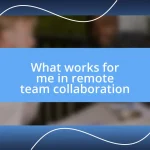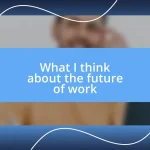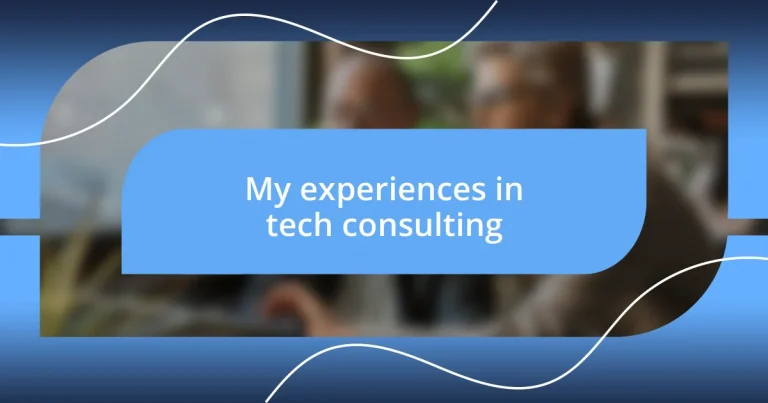Key takeaways:
- Understanding client challenges and fostering strong relationships are crucial for successful tech consulting, enhancing collaboration and outcomes.
- Key skills for tech consultants include effective communication, analytical thinking, and adaptability, which are essential for navigating project complexities.
- Future trends in tech consulting involve leveraging AI, embracing remote collaboration, and prioritizing sustainability, which can redefine client interactions and project effectiveness.
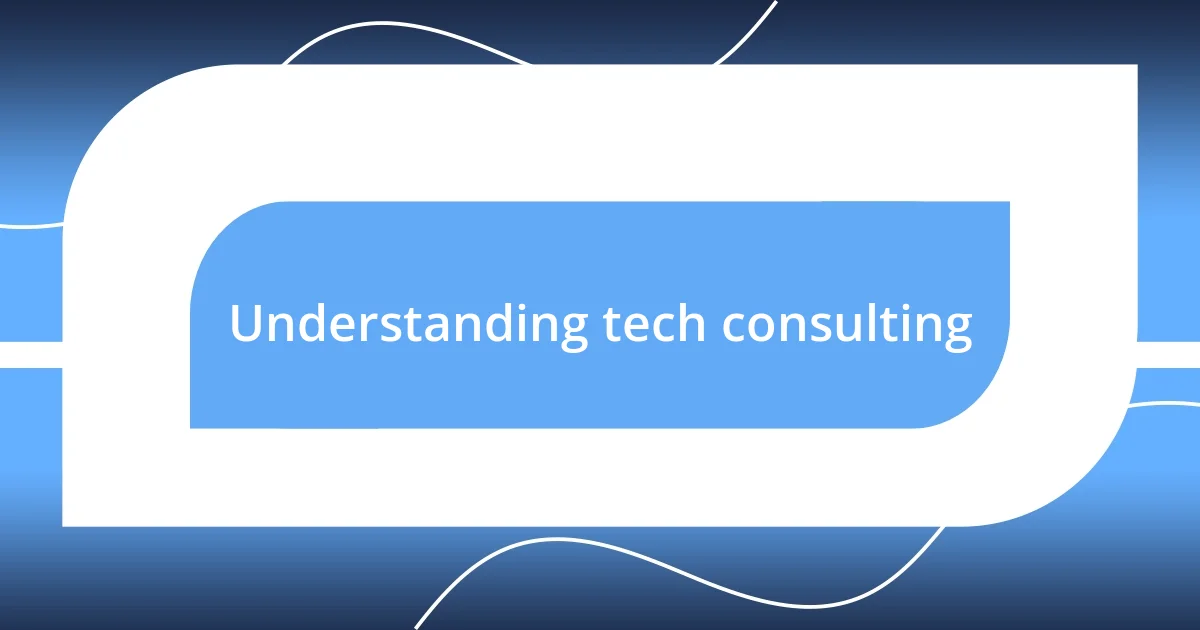
Understanding tech consulting
Tech consulting, at its core, is about bridging the gap between technology and business needs. I remember the first time I helped a small company adopt a new customer relationship management (CRM) system. Their initial resistance turned into excitement as they saw the impact on their sales process. Have you ever experienced that moment when a new tool suddenly transforms the way you work? It’s exhilarating!
In my journey through tech consulting, I’ve learned that understanding a client’s unique challenges is crucial. For instance, I once worked with a healthcare provider facing overwhelming data management issues. By asking the right questions and actively listening, I helped them streamline their operations, which not only increased efficiency but also improved patient care. That moment when they realized they could serve their patients better was incredibly rewarding for both them and me.
Many people underestimate the relational aspect of tech consulting. It’s not just about implementing technology; it’s about fostering trust. I recall a project where I spent afternoons just getting to know the team before diving into the technical details. When clients feel understood and supported, it transforms the entire consulting experience. Have you ever noticed how much smoother projects go when relationships are strong? I certainly have, and it’s something I always strive to cultivate.
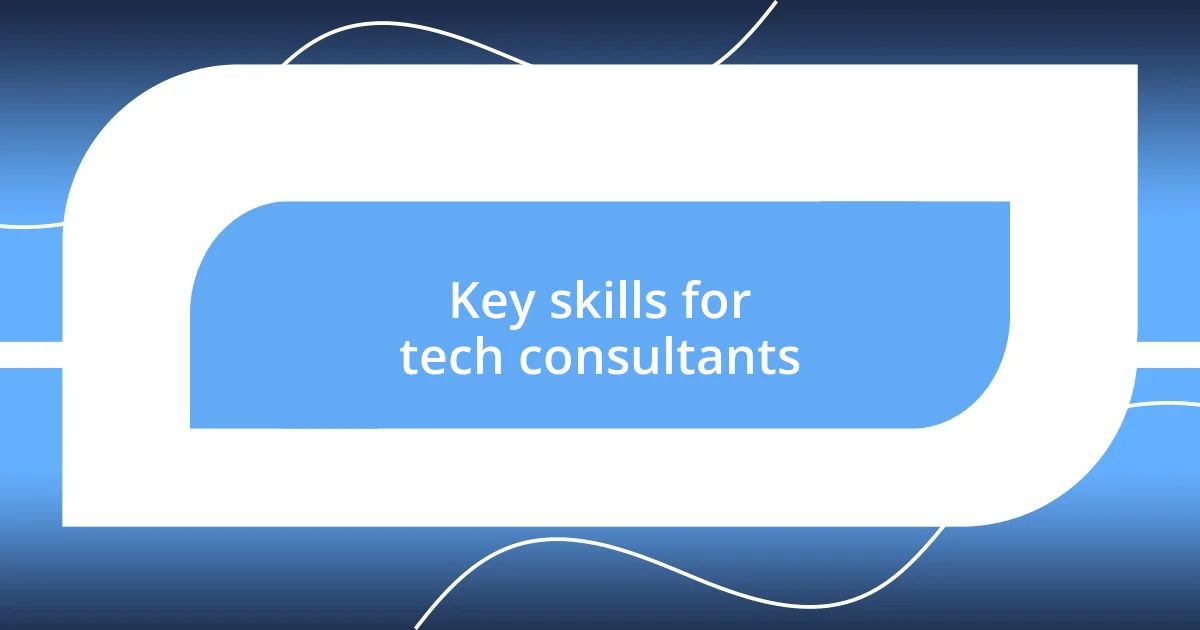
Key skills for tech consultants
I’ve found that effective communication is perhaps the cornerstone of success in tech consulting. It’s not just about sharing technical knowledge; it’s about conveying that information in a way that resonates with clients. I recall a project where I had to explain a complex data migration strategy to a team that wasn’t particularly tech-savvy. By breaking down the jargon and using relatable analogies, the entire team became not just informed, but also engaged in the process. That moment of clarity, when I saw their eyes light up with understanding, reinforced how vital this skill is in our field.
Here’s a quick overview of some key skills that I believe every tech consultant should hone:
- Analytical Thinking: Ability to assess complex problems and find effective solutions.
- Technical Proficiency: Strong grasp of tech tools and platforms relevant to the client’s needs.
- Project Management: Skills in organizing resources, timelines, and tasks efficiently.
- Active Listening: A dedication to understanding clients’ challenges without jumping straight to solutions.
- Interpersonal Skills: Building relationships to foster a collaborative consulting environment.
- Adaptability: Being flexible and responsive to rapidly changing requirements or innovative technologies.
Each of these skills can shape the consulting experience and ultimately drive successful outcomes for clients.
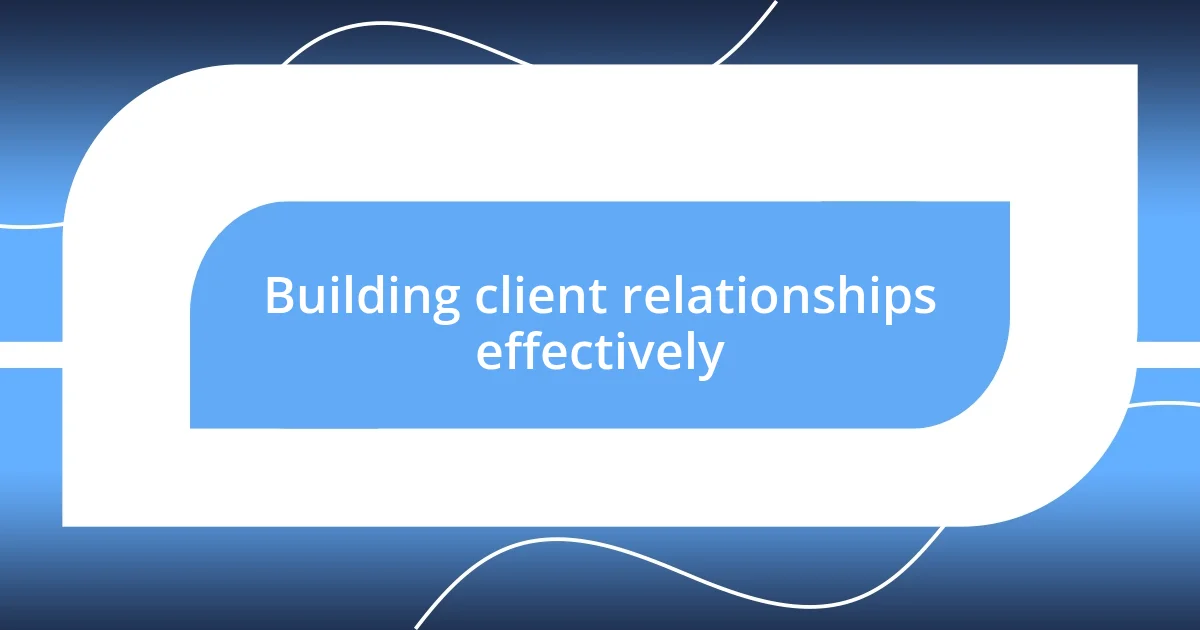
Building client relationships effectively
Building effective client relationships is truly a game-changer in tech consulting. One memorable experience I had was with a retail client struggling to manage their inventory system. Instead of diving straight into technical fixes, I took the time to understand their business culture and team dynamics. We ended up organizing weekly check-ins, which fostered a sense of partnership. I genuinely felt the shift in their attitude towards our collaboration; they transformed from hesitant participants into enthusiastic contributors. Isn’t it fascinating how the right approach can change everything?
Another lesson I’ve learned is the importance of maintaining transparency throughout the consulting process. One of my clients once faced unexpected challenges during an implementation phase. Instead of hiding the issues, I chose to keep them fully informed. By being candid about the setbacks and brainstorming solutions together, we built a stronger bond. It was reassuring for them to know that I considered them a part of the journey rather than just a destination. Have you ever felt a stronger connection when you’ve shared both challenges and successes with someone? That mutual support can lead to incredible outcomes.
Lastly, I can’t stress enough the power of empathy in client relationships. In a particularly draining project, a client team expressed their stress and concerns about meeting deadlines. I shared my own experiences of feeling overwhelmed and stressed, reinforcing that they weren’t alone in this. By creating an empathetic environment, we opened the door for honest discussions about limitations. It was moments like these that deepened our relationship while also enhancing collaboration. In my opinion, empathy isn’t just a soft skill; it’s a foundational pillar in creating lasting partnerships.
| Approach | Benefits |
|---|---|
| Understanding Client Culture | Builds trust and encourages collaboration |
| Transparency in Communication | Fosters accountability and a sense of partnership |
| Empathy and Support | Enhances teamwork and fosters deeper connections |
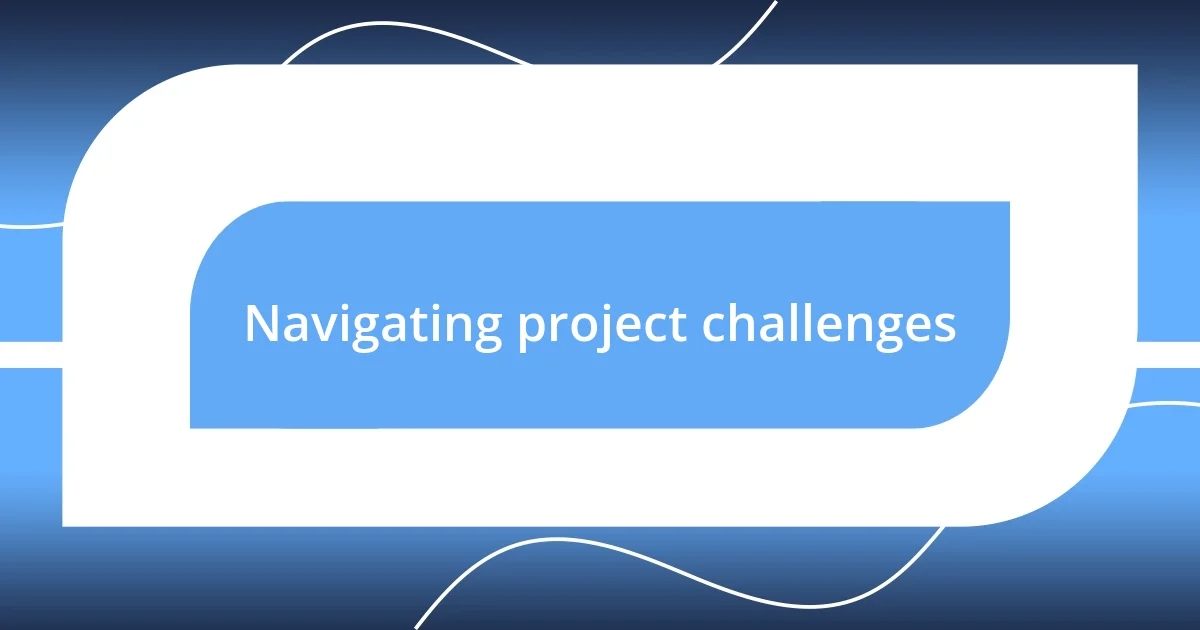
Navigating project challenges
Navigating project challenges often brings unexpected hurdles that can test even the most prepared consultant. I remember a project where we hit a significant technical snag just days before a major deadline. Rather than getting overwhelmed, we gathered the team for a brainstorming session. The collective energy and creativity that emerged in that room were incredible. It made me realize that sometimes, the best way to address challenges is to lean on the very people who understand the project most intimately. Have you ever experienced that surge of insight when a diverse group tackles a problem together?
Every project has its share of unforeseen issues, and I learned early on that flexibility is crucial. I once worked on a software implementation that had to pivot halfway through due to changing client requirements. Instead of seeing change as a setback, I regrouped with my team, reassessed our objectives, and adjusted our timeline. Embracing that shift not only saved the project but also reinforced a sense of resilience in the team. It’s amazing how adaptability can turn potential stumbling blocks into opportunities for growth.
Moreover, I can’t emphasize enough the importance of maintaining a positive mindset amidst challenges. During a particularly grueling project, our morale began to wane after a few setbacks. I initiated daily stand-up meetings focusing not just on problems but also on our wins, however small. This seemingly simple shift in perspective revitalized our spirit. Have you ever noticed how celebrating even minor achievements can create a ripple effect of motivation? In the end, navigating project challenges becomes less about the obstacles themselves and more about how we choose to respond to them.
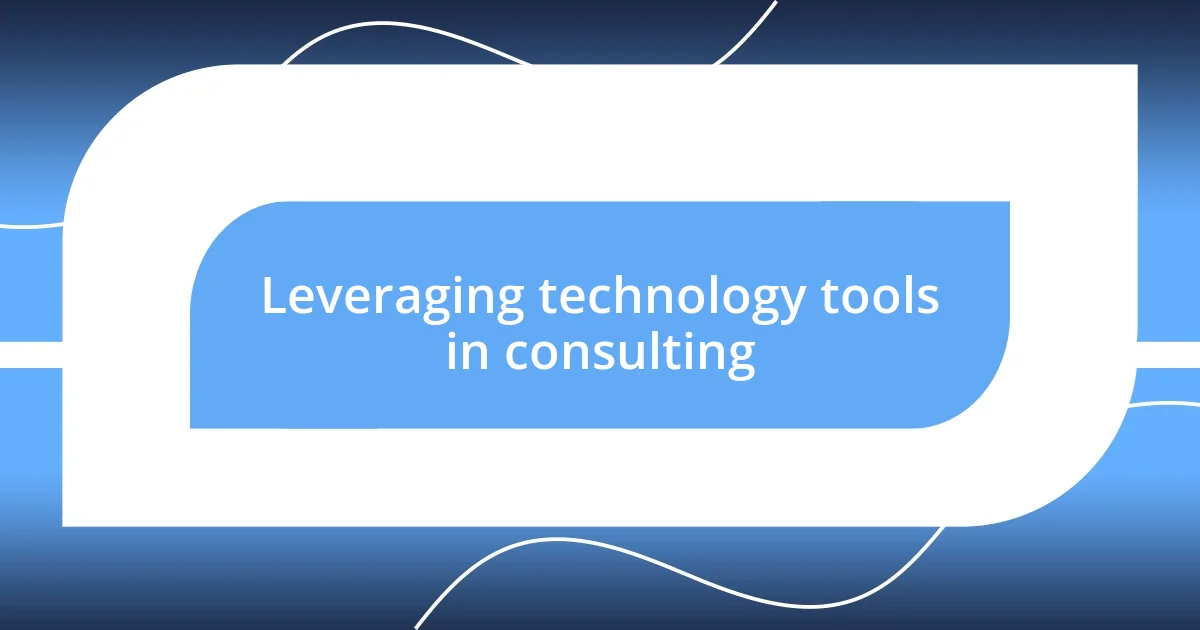
Leveraging technology tools in consulting
In my experience, using technology tools in consulting can dramatically streamline processes and enhance collaboration. When I first adopted project management software, it felt like I had unlocked a new level of efficiency. I remember a specific case where the client team struggled to track their progress on various tasks. Implementing a tool like Trello not only provided visibility into everyone’s responsibilities but also sparked healthier communication. Have you ever noticed how a simple tool can create a significant shift in teamwork dynamics?
Another powerful tool I’ve leaned on is data analytics, which helps in making informed decisions. On one occasion, I was working with a client who wanted to optimize their marketing strategies. By harnessing data visualization tools, I helped them identify patterns in customer behavior that were previously overlooked. This deep dive provided valuable insights that guided their next campaign, leading to a notable boost in engagement. It’s fascinating how technology can reveal stories hidden within the numbers, isn’t it?
Moreover, I can’t underestimate the importance of communication tools in fostering a collaborative environment. During a remote project, our team relied heavily on platforms like Slack for daily updates and quick check-ins. I found that creating designated channels for specific discussions resulted in clarity and a sense of community, even from a distance. This experience made me realize that the right technology can not only enhance productivity but also strengthen team bonds, turning a group of individuals into a cohesive unit.
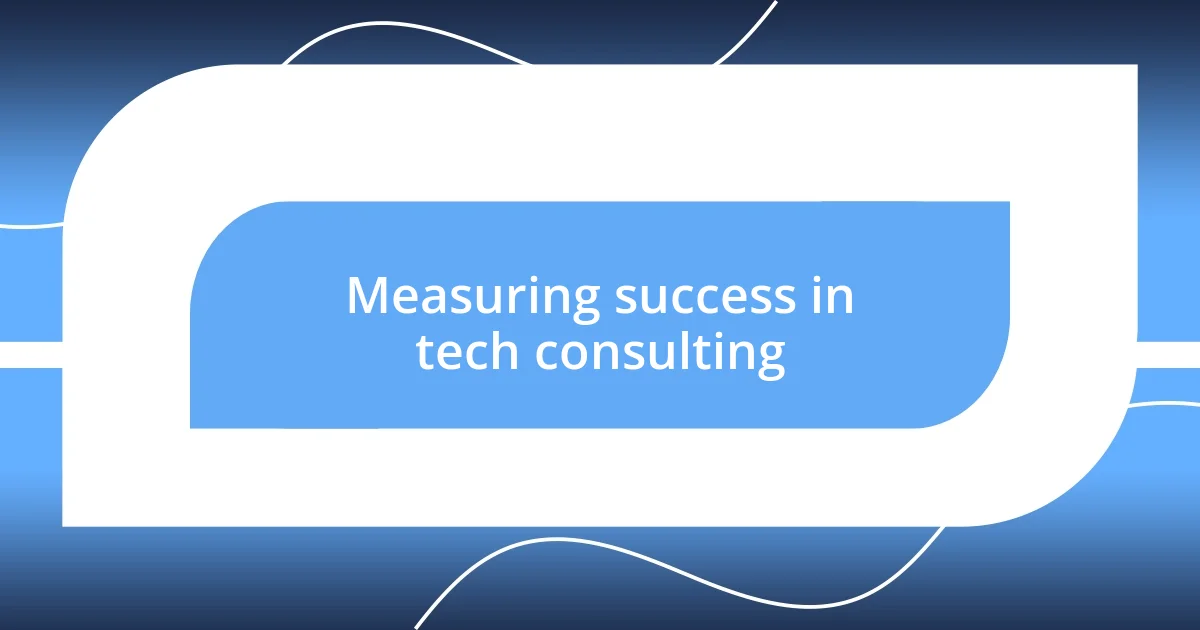
Measuring success in tech consulting
Measuring success in tech consulting can sometimes feel like navigating a maze without a map. I’ve often found that success isn’t solely defined by meeting deadlines or sticking to budgets; it’s about the value delivered and fostering deeper client relationships. For instance, I once wrapped up a project that, by all metrics, was a success. However, the real win came later when the client shared how our solution transformed their workflow and boosted team morale. Isn’t it rewarding when your work has a lasting impact?
Another critical aspect I’ve come to appreciate is the role of feedback in refining our approach. Post-project reviews can be a treasure trove of insights. I remember leading a session where team members and clients openly discussed what went well and what didn’t. The revelations were eye-opening! It taught me that measuring success also means being open to constructive criticism and learning from it. How do you actively seek feedback in your projects?
Lastly, I believe tracking KPIs (Key Performance Indicators) provides tangible evidence of success. From my experience, integrating KPIs like user adoption rates and customer satisfaction scores can illuminate the true effectiveness of a project. For instance, a dashboard we created to visualize these metrics helped us celebrate achievements together as a team. It was incredible to witness how this clarity drove motivation and accountability among us. Have you found KPIs to be a game-changer in demonstrating success?
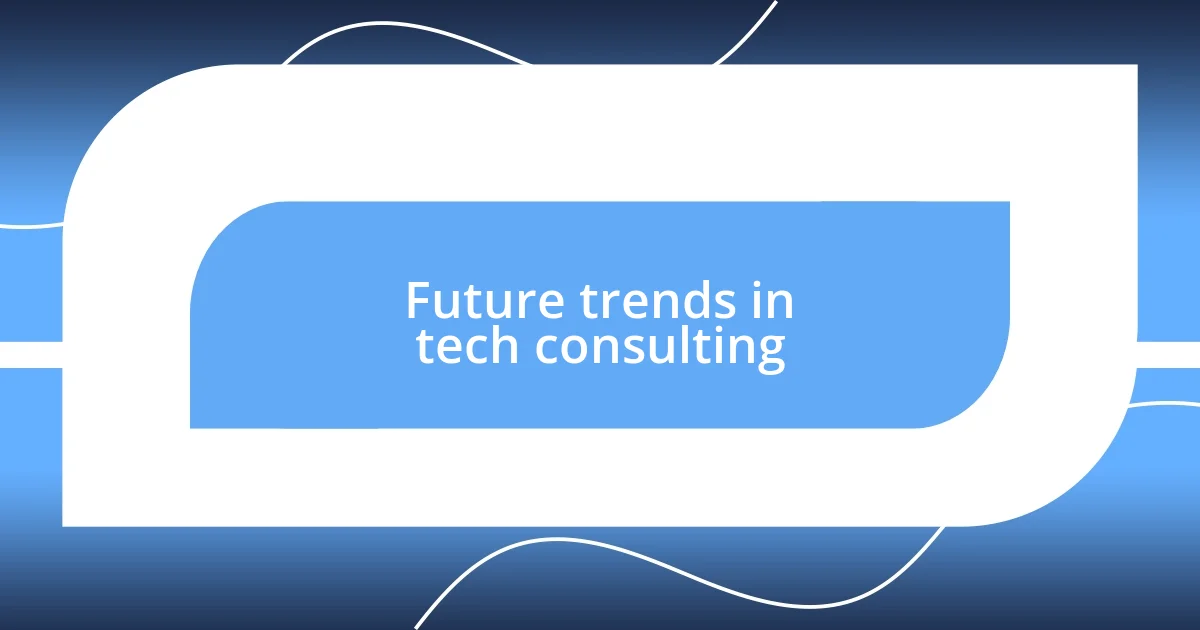
Future trends in tech consulting
One future trend I am particularly excited about is the rise of artificial intelligence in tech consulting. I remember a project where we utilized AI-powered tools to assess risk factors for a client’s software deployment. The insights we gleaned were remarkable—not only did they save the client time, but they also helped preempt potential issues. Have you ever wondered how automation could redefine problem-solving for businesses? It’s a fascinating concept that could vastly improve efficiency.
Furthermore, the shift towards a more remote workforce is reshaping how consultants operate. I’ve seen an increase in virtual consulting engagements where collaboration transcends geographical boundaries. One experience that stands out was leading a multinational team through a complex project entirely online. The variety of perspectives and skills from across the globe enriched our outcomes significantly. How do you think remote work will alter the landscape of client interactions? It seems to me that the more diverse the team, the more innovative the solutions.
Sustainability is also becoming a focal point in tech consulting, and I can’t help but feel a sense of responsibility to embrace it. A project I consulted on involved guiding a client toward greener technology solutions. Witnessing their commitment to sustainability not only crafted a positive brand image but also resonated with their employees and customers. It’s a reminder that our work doesn’t just influence profit margins; it impacts the planet. How do you envision integrating sustainability into your consulting practices? It’s worth considering, don’t you think?


